|
|
|
Sort Order |
|
|
|
Items / Page
|
|
|
|
|
|
|
| Srl | Item |
| 1 |
ID:
086325
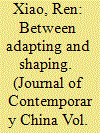

|
|
|
|
|
| Publication |
2009.
|
| Summary/Abstract |
This paper attempts to examine the process of China's participation in regional cooperation in Asia and the factors that affect its participation. It focuses on a changing China-ASEAN relationship that is reshaping Asia. To build a peaceful and stable external environment, China has been making various efforts, political, economic and in the security field, to maintain and upgrade a harmonious and constructive relationship with its neighboring East Asian countries. Politically, China acceded to the Treaty of Amity and Cooperation in Southeast Asia (TAC), essentially accepting the code of conduct stipulated by ASEAN and prompting other regional countries to observe this code. China has been supportive of ASEAN, playing a leadership role in East Asian regional cooperation. China and Asian regional cooperation is an evolving concept and a couple of theoretical points may be taken into account, such as how regional cooperation influences major powers' international behavior and vice versa.
|
|
|
|
|
|
|
|
|
|
|
|
|
|
|
|
| 2 |
ID:
172117
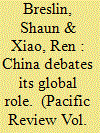

|
|
|
|
|
| Summary/Abstract |
The very simple and straightforward aim of this special issue is to outline and analyse how debates over international politics and China’s global role have evolved in China in recent years. In particular, we want to open up debates that can be found in the Chinese language literature to an audience that might not normally be able to access or understand them. To be sure, there is now a relatively large cohort of Chinese academics publishing in English in high quality outlets and participating in international conferences. Their scholarship and insights have done much to increase knowledge and understanding of Chinese thinking. Even so, we think the time is right for a collection that looks in depth at Chinese debates and discourses for five main reasons.
|
|
|
|
|
|
|
|
|
|
|
|
|
|
|
|
| 3 |
ID:
145406
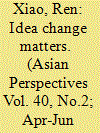

|
|
|
|
|
| Summary/Abstract |
In this article I examine the changes in China's foreign policy thinking and how they have influenced China's international behavior. I reveal how the leadership's beliefs guided and drove the Chinese state's behavior. When leaders believed that the world was in a “war and revolution” age, China was inclined to overlook the actual international order and institutions and backed revolutionary movements or armed struggles in other countries. The cognitive shift to “peace and development” in the 1980s, which was consolidated in the 1990s through two major debates, was fundamental in terms of strategically reshaping China's behavior, turning it from a revolutionary state into a quasi–status quo state. Besides embracing international institutions, China has also joined neighboring countries in creating new regional institutions and norms in East Asia. I argue that ideas, and not only perceptions, guide China's policymaking and international behavior.
|
|
|
|
|
|
|
|
|
|
|
|
|
|
|
|
| 4 |
ID:
107181


|
|
|
|
|
| Publication |
2011.
|
| Summary/Abstract |
There are different driving forces behind Chinese foreign policy decision-making. Norms, principles, and interests and the subtle combinations of them, I argue in this paper, are the major driving forces on the input side, while the domestic situation of a specific country and international pressure undercut China's policy deliberations. By contrast, the form of government of a specific country under discussion is not an important variable. In this paper, I use China's policy toward Myanmar as a case study. The findings prove that the integration of norms, principle and practical interests has formed the powerful impetus that drives China's policies toward Myanmar. Among these factors, the interests China has identified in general and stability on its "doorstep" in particular play a dominant role, while the norm of human security and the principle of non-interference are embedded in its policy deliberations.
|
|
|
|
|
|
|
|
|
|
|
|
|
|
|
|
| 5 |
ID:
107163
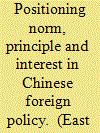

|
|
|
|
|
| Publication |
2011.
|
| Summary/Abstract |
There are different driving forces behind Chinese foreign policy decision-making. Norms, principles, and interests and the subtle combinations of them, I argue in this paper, are the major driving forces on the input side, while the domestic situation of a specific country and international pressure undercut China's policy deliberations. By contrast, the form of government of a specific country under discussion is not an important variable. In this paper, I use China's policy toward Myanmar as a case study. The findings prove that the integration of norms, principle and practical interests has formed the powerful impetus that drives China's policies toward Myanmar. Among these factors, the interests China has identified in general and stability on its "doorstep" in particular play a dominant role, while the norm of human security and the principle of non-interference are embedded in its policy deliberations.
|
|
|
|
|
|
|
|
|
|
|
|
|
|
|
|
| 6 |
ID:
143553
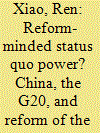

|
|
|
|
|
| Summary/Abstract |
This paper analyses the case of China in the G20 process and examines China’s position and policies on relevant issues, including international monetary system reform, reform of the international financial institutions (IFIs), international financial regulation, the future of the dollar, and internationalisation of the renminbi. My findings demonstrate that China has actively participated in the G20’s deliberations and actions, put forward its suggestions, sought an expanded share and voting power in the IFIs in correspondence with its rising status, and promoted the internationalisation of the renminbi. It does not aspire to overthrow this system within which it has prospered. In this sense China is a status quo power. Meanwhile China argues that the current international order is flawed and that there exist a number of unjust and unreasonable components. They have long needed to be changed. My conclusion is that China is not a complete but rather a reform-minded status quo power.
|
|
|
|
|
|
|
|
|
|
|
|
|
|
|
|
| 7 |
ID:
107176
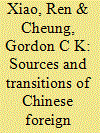

|
|
|
|
|
| Publication |
2011.
|
| Summary/Abstract |
Chinese foreign policy has multiple sources, and the incentives that are driving its behaviour have grown from the domestic/international, as well as from regional, economic, normative, multilateral, and cultural levels. Foreign policy-making in China is becoming increasingly complex and sophisticated. This special issue is drawn from some edited papers presented in the joint workshop between Fudan and Durham Universities on Chinese foreign policy on 29-30 March 2010. By assessing the economic, domestic, regional, global and cultural sources of Chinese foreign policy, we aim to illustrate the various sources and to locate possible ways to consolidate the transitional process, and to spur future endeavour facing China's foreign policy.
|
|
|
|
|
|
|
|
|
|
|
|
|
|
|
|
| 8 |
ID:
141769
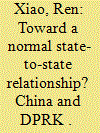

|
|
|
| 9 |
ID:
155268
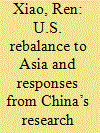

|
|
|
|
|
| Summary/Abstract |
The U.S. “pivot” or rebalance toward the Asia-Pacific region, under the Obama Administration, was viewed as a major foreign strategy initiative. Inevitably China became an important part of the whole picture. Overall, China has estimated the U.S. rebalance to Asia in a cool-minded manner, and has tried not to overreact to the rebalance. However, with the election of Donald Trump as the new U.S. President, considerable uncertainties are emerging regarding U.S. policies toward Asia and China. Challenges are ahead of us to manage the Sino-American relationship in the coming year.
|
|
|
|
|
|
|
|
|
|
|
|
|
|
|
|
|
|
|
|
|